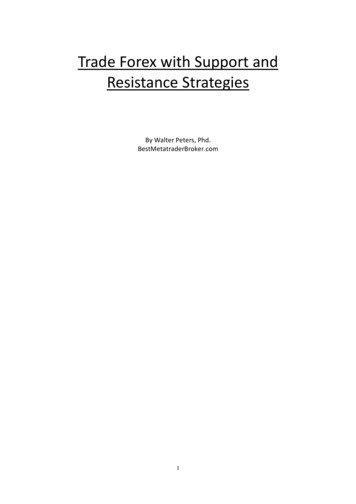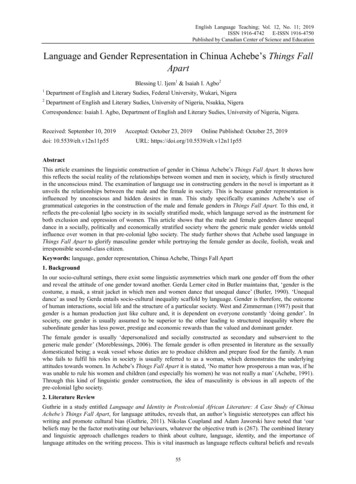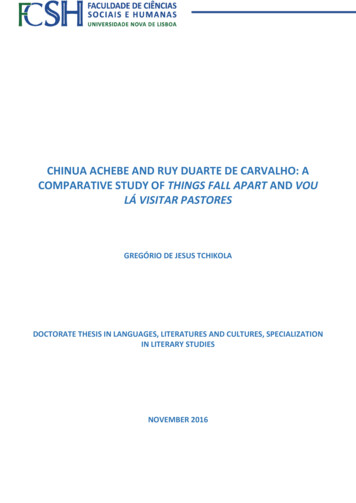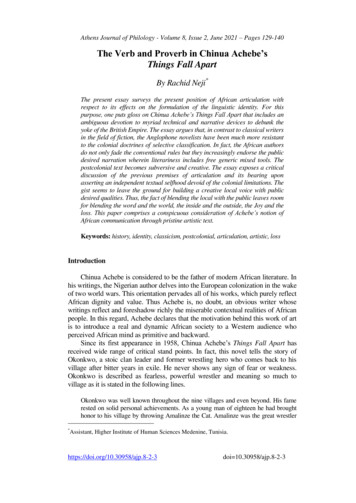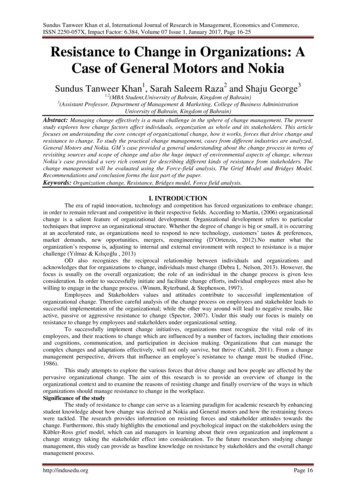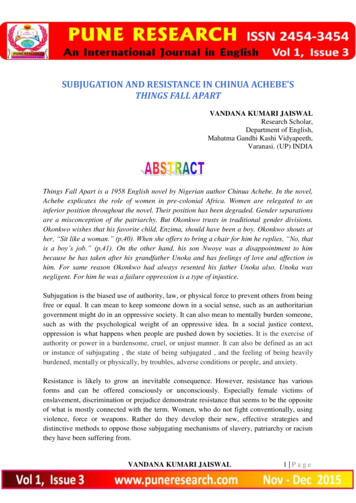
Transcription
SUBJUGATION AND RESISTANCE IN CHINUA ACHEBE’STHINGS FALL APARTVANDANA KUMARI JAISWALResearch Scholar,Department of English,Mahatma Gandhi Kashi Vidyapeeth,Varanasi. (UP) INDIAThings Fall Apart is a 1958 English novel by Nigerian author Chinua Achebe. In the novel,Achebe explicates the role of women in pre-colonial Africa. Women are relegated to aninferior position throughout the novel. Their position has been degraded. Gender separationsare a misconception of the patriarchy. But Okonkwo trusts in traditional gender divisions.Okonkwo wishes that his favorite child, Enzima, should have been a boy. Okonkwo shouts ather, “Sit like a woman.” (p,40). When she offers to bring a chair for him he replies, “No, thatis a boy’s job.” (p,41). On the other hand, his son Nwoye was a disappointment to himbecause he has taken after his grandfather Unoka and has feelings of love and affection inhim. For same reason Okonkwo had always resented his father Unoka also. Unoka wasnegligent. For him he was a failure oppression is a type of injustice.Subjugation is the biased use of authority, law, or physical force to prevent others from beingfree or equal. It can mean to keep someone down in a social sense, such as an authoritariangovernment might do in an oppressive society. It can also mean to mentally burden someone,such as with the psychological weight of an oppressive idea. In a social justice context,oppression is what happens when people are pushed down by societies. It is the exercise ofauthority or power in a burdensome, cruel, or unjust manner. It can also be defined as an actor instance of subjugating , the state of being subjugated , and the feeling of being heavilyburdened, mentally or physically, by troubles, adverse conditions or people, and anxiety.Resistance is likely to grow an inevitable consequence. However, resistance has variousforms and can be offered consciously or unconsciously. Especially female victims ofenslavement, discrimination or prejudice demonstrate resistance that seems to be the oppositeof what is mostly connected with the term. Women, who do not fight conventionally, usingviolence, force or weapons. Rather do they develop their new, effective strategies anddistinctive methods to oppose those subjugating mechanisms of slavery, patriarchy or racismthey have been suffering from.VANDANA KUMARI JAISWAL1 Page
In this article, I have made an attempt to analyze the Igbo women’s subjugation andresistance in the context of Chinua Achebe’s Things Fall Apart . Achebe exposes the subtleprocesses of subjugation and gender differentiation operative within the institution of thefamily and the male-centered Igbo society at large. These include social and psychologicalfactors such as, woman’s subordinate position in the family and her restricted sexuality. Theauthor seeks to expose the ideology by which a woman is trained to play her subservient rolein societyAchebe is indebted to Yeats for the title as it has been taken from Yeats’ poem The SecondComing. Achebe is a fastidious, skillful artist and garnered more critical attention than anyother African writer. His reputation was soon established after his novel Things Fall Apart.He made a considerable influence over young African writers. It is seen as the archetypalmodern African novel in English. It seeks to discover the cultural zeitgeist of its society.Critics tend to agree that no African novelist writing in English has surpassed Achebe’sachievement in Things Fall Apart. Things Fall Apart is a milestone in African literature. It isconsidered to be Achebe’s magnum opus. Things Fall Apart is Achebe’s sincere attempt toguide people in their struggle to make their freedom meaningful, functional and relevant. Heis a committed writer who believes it is his duty to serve his society.Things Fall Apart is an attempt to redeem the dignity of Africa. It is not a past to lamentover. Achebe has maintained pathos and ethos of original language. He attempts to preservethe artistic world of the African past. He portrays the psychological problems of a generationof Africans suddenly superstitious without any reason and logic. In fact racists have labeledthem as savage. And it was considered White Man’s Burden to enlighten such ignorantpeople. Achebe reminds that Africa had a rich past and a legacy and that not only the whiteshave a right to have history and a rich past. The title implies that the center is weak andcannot hold. Cultures crumble and civilizations disintegrate in Things Fall Apart. The novelis set in a traditional Ibo village community at the turn of the century when the first Europeanmissionaries and administrative officials were beginning to encroach inland.Okonkwo, protagonist is a leader of the Umuofia clan. He is a highly respected man in hisvillage; the only problem he has to face is his son, Nwoye, who, in his father's eyes, is an idleand negligent young man of twelve years old. On the Week of Peace, Okonkwo breaks the“law” when he beats one of his wives, Ojiugo, because she was too negligent. This was thefirst case when he shocked his family and tribe. The Oracle makes a decision Okonkwo's"adopted son" has to be sacrificed. Okonkwo does not want to appear weak, he killsIkemefuna with great cruelty. Nwoye, who had become great friends with Ikemefuna, grievesand is again afraid of Okonkwo, whom he could stand when Ikemefuna was around. At thefuneral of the old clansman, Okonkwo’s gun blows up and take the life of Ezeudu’s son.Because of an accidental killing, he is exiled from the village for seven years. He goes toVANDANA KUMARI JAISWAL2 Page
Mbanta, the native village of Okonkwo’s mother. Ezeudu’s family destroys everything thatwas related to the ex-leader of the clan in order to purify the village of the sin. Whitemissionaries arrive in Umuofia and Christianize the villagers. Nwoye also Christianizes.Seven years have passed and Okonkwo returns to his village where the missionaries havealready converted most of the local people. When he returns after seven years he finds thingshave changed drastically. White missionaries have established themselves and some peopleof his village have converted to their religion. Okonkwo tries to rouse his clan to take actionagainst these foreigners and their institutions. He was ready to stand for and fight for hiscommunity but others did not feel as strongly as Okonkwo about the new dispensation.Okonkwo’s tragic mood indicates an affirmation of the validity of the past. And movement ofthe plot indicates acceptance of the present as it is.“Okonkwo was deeply grieved. And it was not just a personal grief. He mourned forthe clan, which he saw breaking up and falling apart and he mourned for the warlikemen of Umuofia, who had so unaccountably become soft like women.” (Achebe 165).In a rage he kills one of the white men and then in order to avoid the disgrace of being caughtat the hands of white men he commits suicide. There is a contrast in the way he lived his lifeand in the way he faces death. His death marks that unchecked manliness complex may resultin a disaster. When his kinsmen find his dead body they refuse to touch it and instead asks thewhite men to bury him. On being asked the reason one of them explains,“It is against our custom. It is an abomination for a man to take his own life. It is anoffence against the Earth, and a man who commits it will not be buried by hisclansmen. His body is evil,and only strangers may touch it.” (Achebe 186).There are constant struggles between gender, identity, commoditization, and class. ChinuaAchebe wrote the novel, Things Fall Apart, which is a great piece of African literature thatdeals with the Igbo culture, history, and the taking over of African lands by Britishcolonization. The ongoing gender conflict is a prominent theme in Things FallApart presenting the clash between men and women of the African Igbo society. Throughouthistory, from the beginning of time to today, women have frequently been viewed as inferior,men’s possessions whose sole purpose was to satisfy the men’s needs. May be it's becausemen are physically stronger than women and have always had the ability to control them thatway. In Things Fall Apart , the Igbo women were perceived as being weak. The recurringtheme of gender conflicts helps to drive the novel Things Fall Apart by showing howimportant women are to the men, yet they do not receive the treatment they deserve.There are many cases in Achebe’s Things Fall Apart which show that Igbo women are oftenbeaten by their husbands because of little things that they do or because the men easily losetheir tempers. The men punish women because they know that they will never fight back andVANDANA KUMARI JAISWAL3 Page
because it is acceptable in their culture. Okonkwo is a person who doesn’t show any type ofemotion except for anger. He believes other emotions symbolize weakest, therefore he useshis “heavy hands” as his strength towards people . Okonkwo allows his anger to take controlat times, in one particular case his anger took over, was the “Week of peace”. During the“Week of peace” also known as the sacred week, was the time before people started to plantcrops. The “Week of peace” meant everyone was to live in peace to honor their goddess ofthe earth that will in turn bless, their crops to grow. Because of his anger Okonkwo broke“the peace and was punished” by the earth goddess Ezeani. He had broken the peace bybeating his youngest wife Ojiugo with a passion. Ojiugo had went to get her hair done anddidn’t come back in time to cook lunch. Okonkwo continues to beat Ojiugo even after hisother two wives begged him to stop beating her, after all it was ‘sacred week”. Anothertime Okonkwo displayed his anger was during “The New Yam Festival” when his secondwife, Ekwefi, had cut a few leaves off of the banana tree to wrap food. Okonkwo gets angreeat her and says: “Who killed this banana tree?” Without further argument Okonkwo gaveher a sound beating and left her and her only daughter weeping”(40) . He then left her to cry,however she made a comment and he pointed a gun to her:His anger thus satisfied, Okonkwo decided to go out hunting. He had an oldrusty gun made by a clever blacksmith who had come to live in Umuofia longago. But although Okonkwo was a great man whose prowess was universallyacknowledged, he was not a hunter. In fact he had not killed a rat with hisgun. And so when he called Ikemefuna to fetch his gun, the wife who had justbeen beaten murmured something about guns that never shot. Unfortunatelyfor her Okonkwo heard it and ran madly into his room for the loaded gun, ranout again and aimed at her as she clambered over the dwarf wall of the barn.He pressed the trigger and there was a loud report accompanied by the wail ofhis wives and children.(p, 41)As a result of his anger everyone especially his wife and children are very much afraid ofhim. As it is said women experience different oppression against them such lack ofinheritance, equal rights to men, and they are beaten by their husbands without protection. InThings Fall Apart the case of beating is seriously done repeatedly by the men. In this novel,Achebe tries to identify the culture of Igbo men for beating their wives; the known example isfor Okonkwo when beating his wife Ekwefi, Ezimna’s mother. Along with that he attempts tokill him with his gun but he fails to shoot her. It proves that woman role as female in socialwas emphasized in domestic sector. Woman is expected to take care of the children andmanage the households. The woman place is only in the kitchen. It is the woman range. Wealso point Okonkwo’s neighbor, Mgbofo who is tortured by his husband, Uzowulu, evenwhen she is pregnant.VANDANA KUMARI JAISWAL4 Page
Last year when my sister was recovering from an illness, he beat her again sothat if the neighbors had not gone in to save she would have been killed. Weheard of it, and did as you have been told. The law of Umuofia is that if awoman runs away from her husband her bride-price is returned. But in thiscase she ran away to save her life. (p, 96)The harshness did not happen only in Okonkwo’s life or families, but in all of Umuofiaculture.And the tradition of Umuofia people is polygamy. Woman is only like a jewel, used whenthey are needy. A mistake from a man is only a little accident like getting grazed, but when awoman does mistake, it is called a big dangerous like getting crashed by truck. Almost menin Umuofia do polygamy. Okoye, Okonkwo’s neighbor has three wives. Okonkwo also hasthree wives. Nwakibie, the rich man in Okonkwo’s village has nine wives. It is about uselesspeople. This shows that polygamy is given much value in Igbo society whereby women aretaken like properties and unvalued human being. When you think behind this polygamy, youmay find that society has to face many challenges such poverty and the inequality amongwomen who share one husband.Women’s marginalization in Igbo society we can further see the below paragraph. It shows thatwomen are not equal to men. And the first wife is given a little bit respect but the co-wivesare not, as it is exhibited to Nwakibie’s wives. Though you can notice that women are calledfor drinking, they are not allowed to continue drinking together with men. They take thehorns and then after they leave men alone drinking. It shows the culture of gender inequalityin Igbo society whereby men and women have not the same value. The world in Things FallApart is an androcentric world where the man is everything and the woman nothing. Thegreatness of a man in this society is measured in terms of his muscle power, wealth, titles andnumber of wives. It is a polygamous society. Men of titles occupy a place of importance inthe society and are treated with honor and respect. In Things Fall Apart no matter howprosperous a man was, if he was unable to rule his women and his children he was notconsidered to be a man. In Things Fall Apart , the authority lies with the men. Women do nothave a say in any important matter. The idea of masculinity puts women on a remote margin:Everybody thanked Okonkwo and the neighbours brought out their drinkinghorns from the goatskin bags they carried. Nwakibie brought down his ownhorn, which was fastened to the rafters. The younger of his sons, who was alsothe youngest man in the group, moved to the centre, raised the pot on his leftknee and began to pour out the wine. The first cup went to Okonkwo, whomust taste his wine before anyone else. Then the group drank, beginning withthe eldest man. When everyone had drunk two or three horns, Nwakibie sentVANDANA KUMARI JAISWAL5 Page
for his wives. Some of them were not at home and only four came in. "Is Anasinot in?" he asked them. They said she was coming. Anasi was the first wifeand the others could not drink before her, and so they stood waiting. Anasiwas a middle-aged woman, tall and strongly built. There was authority in herbearing and she looked every inch the ruler of the womenfolk in a large andprosperous family. She wore the anklet of her husband's titles, which the firstwife alone could wear. She walked up to her husband and accepted the hornfrom him. She then went down on one knee, drank a little and handed back thehorn. She rose, called him by his name and went back to her hut. The otherwives drank in the same way, in their proper order, and went away. The menthen continued their drinking and talking. (p, 21)In the novel, Things Fall Apart Achebe describes the condition of women in the Igbo societyin which men are permitted to marry many times. Nwakibie,“a wealthy man in Okonkwo’s village who {has} three huge barns, nine wives andthirty children”. ( p, 20)Women are bought and sold into marriage and after marriage they are insulted and beaten bytheir husbands.Achebe shows Igbo as a patriarchal society which gives more importance to their sons than totheir daughters. The sons’ duty is taking care of farming, getting the yam seedling reeds andkeeping the farming instruments ready for farm work. Sons get involved in masquerades,wrestling matches, meetings and accompany their fathers to ceremonies, while the daughter’sworld begins and ends with getting married, giving birth to children and serving the food totheir husbands and children. Besides, Igbo society being a patriarchal one, lays emphasis on awoman’s capacity to give birth to more than one child, especially sons. In the novel, it isshown that the husbands would slaughter a goat for their wives if they give birth to the thirdson in succession. For example, when Okonkwo’s first wife, Nwoye’s mother gives birth to“her third son in succession, Okonkwo had gathered goat for her, as was thecustom”.(82)Women in this novel as Achebe shows are not expected to question men as men are supposedto be ‘self-decisive’. Men do not like their wives questioning them. The woman is given asecondary status. She is neither the head, nor the decision-maker. She has to obey the ordersgiven by her husband.They have to stay home only to cook, do house work, serve husbands and look after children.Through the novel, Achebe clearly shows that anything strong is associated with man andVANDANA KUMARI JAISWAL6 Page
anything weak is associated with woman. For example, Achebe explains that the “yam” cropstands for manliness because of its importance as the staple crop of the Igbo. On the contrary,coco-yam, bean and cassava stand for womanliness. Women as the most hardworkingindividuals in their societies constitute the core of the rural work such as farming, tendinganimals and nurturing children. The imposition of colonial ideology and Victorian attitudesmake the Nigerian women suffer the loss of their traditional status during the colonial andpost-colonial periods. Even the crops are exempted from such discrimination. Yams were animportant crop for these people.“Yam stood for manliness, and he who could feed his family on yams from oneharvest to another was a very great man indeed. Okonkwo wanted his son to be agreat farmer and a great man. He would stamp out the disquieting signs of lazinesswhich he thought he already saw in him.” (Achebe, p.34).Okonkwo says,“I will not have a son who cannot hold up his head in the gathering of the clan. Iwould sooner strangle him with my own hands.” (Achebe 35).This clearly shows the prevailing inequality between the genders in the Ibo community. Andthe analysis also finds out Okonkwo wishes his son to replace him when being dead and hedoes not mention where Ekwefi’s daughter, Ezimna can be given the equal chance to Nwoye.It is obviously that women are not considered like people who can be leaders of the family orthe clan, this is because the majority consider female gender as the weak people who arenothing.Igbo culture is based on male superiority; men were higher up on the social scale and earnedmore respect and honor if they possessed more riches, titles and wives. Women are regardedas unnecessary except for bearing children and performing tasks such as the equivalent ofdomestic chores. Suppression of women, false perceptions of their ability, and blatantdisrespect for their rights are all reasons that masculine dominance is a highly importanttheme in Achebe’s book. Every wrestling match consisted of solely male competitors –“The contest began with boys.” (p,48)and it ended with boys. The egwugwu who remained masked at all times and maintained acommonly known yet supposedly hidden identity could not even tolerate a woman amongthem, blatantly disregarding any consult or opinion a woman had to offer to the tribe. Termsrelated to women were considered offensive and insulting.VANDANA KUMARI JAISWAL7 Page
“Agbala was not only another name for a woman; it could also mean a man who hadtaken no title” (p 15).All of these examples of disregard for women’s worth clearly illustrates Achebe’s message ofmasculine dominance in the Igbo society. His Things Fall Apart famous for the macho imageof the protagonist-Okonkwo leaves little room for the projection of feminine values.Okonkwo vents his anger at his son Nwoye, who preferred his mother’s stories of the“tortoise and its wily ways” to his father’s “masculine stories of violence andbloodshed”(p,55) is very instructive. When Nwoye committed the ultimate ‘abomination’ ofestablishing links with church goers, Okonkwo repudiates him and having doubts over hisown wife and son he says:“How then would he have begotten a son like Nwoye Perhaps he was not his son!No! how could he have begotten a woman for a son? (p. 158-159).Women in the patriarchal Igbo society are expected to fulfill their gender role as ahomemaker and a caregiver in the community while the men are the protector and thebreadwinner of the household; the women are the subordinate to the men. As Beauvoirstated, women are seen as the “Other” as compared to the men who are seen as the Subjectand the Absolute. This situation can be clearly seen in the protagonist, Okonkwo's wives.They are the homemakers and caregivers of the household. Each wife has to obey him at allcosts and they also have to endure Okonkwo's temper and sudden outburst. The living in thepatriarchal society the subordinate status of an Igbo woman is a norm that has been practicedsince their forefather; the position of man and woman is unquestionable. Even so, there is aminority of women who hold a high position in the society.Being a good wife is not an easy thing to do in Umuofia. Everything should be based on therule. Apart from this family situation, it shows that women have many heavy duties to carryout in the family and society as well. When they are not able to fulfill them, they have tosuffer much such as being beaten like Okonkwo’s wife, Ekwefi. Okonkwo treats his wife likea servant, demanding that she does whatever he commands her with no questions asked.Women, as demonstrated by Okonkwo's eldest wife here, are taught to be silent and obedient.In fact, women count for so little in Igbo society that they are often not even addressed bytheir given names, but referred to by their relationship with men. When Okonkwo bringsIkemefuna he says to his wife,"He belongs to the clan," he told her “So look after him”. “Is he staying long withus?” She asked. “Do what you are told, woman,” Okonkwo thundered, andstammered. “When did you become one of the ndichie of Umuofia?” And so Nwoye'smother took Ikemefuna to her hut and asked no more questions.” ( p.16).VANDANA KUMARI JAISWAL8 Page
Regarding the situation happened above, it shows that Okonkwo is not a good man to consultand all what he does, he does not consult his wife before. As their Igbo culture states, womanshould respect her husband, want it or not. When Okonkwo brings Ikemefuna, he has nottaken time to sit together with his wife to see if it is possible and easy to adopt him but thedictatorship mind of Okonkwo as a man, he at once responds to his wife harshly“Do what you are told, woman,” Okonkwo thundered, and stammered”(p,16).This also shows the poor value that men gives women.In the Igbo tribe men take benefit of the contrast between gender and it results inrelationships resembling that of a master and a slave.“No matter how prosperous a man was, if he is unable to rule his women and hischildren (especially his women) he is not really a man.”(p.55)Men treats their multiple wives like property, and any children they bear belongs to the fatheras well.Ekwefi resists although she has a stronger and bolder personality. She has a tendency toprovoke Okonkwo but is different than his other wives because she has one daughter,Ezinma, who is Okonkwo’s favorite. Not only that but Ezinma is the sole surviving child ofthe ten that Ekwefi tried to have. In this way, Ekwefi resists the oppressive forces that actagainst her, such as her bad ‘chi’ , personal god, and her husband, Okonkwo. One of themajor forces acting against Ekwefi is her own chi, which is her personal god. While thesubject of even the existence of spirits and gods is debatable, there is no doubt that Ekwefihas an issue with childbirth. In the eyes of Igbo culture, the blame would go to both the badchi of Ekwefi and the ogbanje, an evil child spirit who reincarnates, that continues to tormenther by dying. Ekwefi suffers a great deal because of this and “as she buries one child afteranother her sorrow gives way to despair and then to grim resignation.” (p.88). Despite theagony of consistently losing children, she never gives up physically trying and goes to apowerful medicine man for help. Her character is very positive . When hope is almost lost,she gives birth to Ezinma, who survives longer than expected and revives love into Ekwefi.The priestess has now reached Okonkwo's compound and is talks to him outside his hut. Shewas saying again and again that Agbala wanted to see his daughter, Ezinma. She comes totake Enizma and brings her. Ekwefi does not sleep and Okonkwo asks her:“Why do you stand there as though she had been kidnapped?” asked Okonkwo as hewent back to his hut. “She will bring her back soon,” Nwoye's mother said .ButEkwefi did not hear these consolations. She stood for a while, and then, all of aVANDANA KUMARI JAISWAL9 Page
sudden, made up her mind. She hurried through Okonkwo's hut and went outside."Where are you going?" he asked. "I am following Chielo," she replied anddisappeared in the darkness.(p,107)Achebe shows that woman can achieve what is in her mind. If she wants to do anything, shecan do it. For example, Ekwefi first marries to Anene, her previous husband becauseOkonkwo was too poor then to marry. Two years after her marriage to Anene she cannot bearit no longer and she runs away to Okonkwo. It is explicitly realized in the context of themajor divinities of the Igbo land. The goddess of the Earth (Ani) has a male (Ezeani) as apriest, whereas the male Oracle of the Hills and the Caves (Agbala) is served by the priestessChielo. Chielo comes to take Ezinma during the night claiming that Agbala wants to see her:“Okonkwo pleaded with her to come back in the morning because Ezinma was nowasleep. But Chielo ignored what he was trying to say and went on shouting thatAgbala wanted to see his daughter . Okonkwo was still pleading that the girl hadbeen ill of late and was asleep. . The priestess suddenly screamed. “Beware,Okonkwo!” She warned. “Beware of exchanging words with Agbala. Does a manspeak when a god speaks? Beware!”.(p,105)Though Things Fall Apart, Okonkwo is presented as brave, courageous and manly. He hasnot been portrayed bowing down before anyone in any circumstances, but, here, we witnessthat a woman orders Okonkwo to give her his little daughter. Actually, she threatens him. Theway Okonkwo agrees to her order is an explicit evidence of a spiritual power of the priestess.Through this episode, Achebe clearly reveals a high degree of honour for a woman in Igbosociety that she can perform the role of a priestess, a spiritual leader. Chielo's role as thepriestess of Agbala exhibits her obligation as the caretaker of a social custom. She presentsherself as a great stateswoman to the service of humanity in her society. A brave leader likeOkonkwo cannot prevent Chielo from performing her spiritual duty to her society. In thedead of the night when others (male and female) experience their slumber, Chielo tries herhard to keep Ezinma alive. While reading the novel, we feel that women are not placed at arespectedposition; still they perform significant role in bringing up, cultivating andpreserving the Igbo family, social and cultural traditions and customs. As it is clearly seen inthe novel that many of the spiritual entities comprise goddesses and Chielo as a femalecharacter plays the role of a priestess.It reveals that an image of a woman is viewed at a whole at different levels. Everyone in theIgbo society is honourably submissive to her including so called brave men. Women are seenas agents of important social and cultural changes through the roles they play. The roles ofmen in this novel are limited in terms of their authority and masculine power. However, upondelving beneath this deceiving surface, readers can see that the women of the Igbo clan holdVANDANA KUMARI JAISWAL10 P a g e
some powerful position: spiritually as the priestess, symbolically as the earth goddess, andliterally as the nurturers of the Ibo people, the caretakers of the yam crops and the mothersand educators of the Igbo children. Achebe is quite progressive and flexible in presenting hiswomen characters. He reveals the power and strength of women in Igbo society. The womenfolk are helpful to their families and society in multiple ways. While describing Igbo society,it is shown that women work enthusiastically in their society shouldering responsibilities withtheir men; even they work more than their men because they perform household duties, lookafter their children, and serve their husbands and at the same time, they work outside of theirkitchen to provide their families financially. For example as it is clearly explained in thenovel:“As the rains became heavier the women planted maize, melons and beans betweenthe yam mounds. The yams were then staked, first with little sticks and later with talland big tree branches. The women weeded the farm three times at definite periods inthe life of the yams, neither early nor late.”Despite her special powers, Ekwefi or other female characters shall be perceived as arepresentative of the community. .Ekwefi’s life and her character are as unique as the formsof her subjugation and resistance. It is this combination of individual and collective suffering,opposition and hope for a better life that makes Ekwefi finally instigate active resistance. Inconclusion of her acts of resistance, it must be found that she is an extraordinary and strongcharacter.Achebe, Chinua. Things Fall Apart. Delhi: Surjeet Publication. 2007.(All the quotations have been cited from this edit
SUBJUGATION AND RESISTANCE IN CHINUA ACHEBE’S THINGS FALL APART VANDANA KUMARI JAISWAL Research Scholar, Department of English, Mahatma Gandhi Kashi Vidyapeeth, Varanasi. (UP) INDIA Things Fall Apart is a 1958 English novel by Nigerian author Chinua Achebe. In the novel, Achebe

